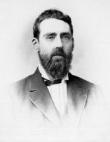Henry Wrixon arrived in Melbourne in the company of his father and mother, the former a lawyer who worked mainly in Victoria's western districts. The younger Wrixon was educated at Portland and entered the University of Melbourne in 1855. But he completed his BA at Trinity College, Dublin, where he earned a reputation as a notable debater. He was called to the Irish Bar in 1861, but he returned to Victoria in 1863.
Wrixon was elected to Victoria's Legislative Assembly in 1868 and was appointed solicitor-general in 1870. After marrying the wealthy widow Charlotte Anderson in 1872, he bought 'Raheen', now one of Melbourne's most famous nineteenth century mansions. He pursued a long political career, retiring in 1910. He was alsoVice-chancellor of the University of Melbourne (1897-1910), a trustee of the Public Library, Museums, and National Gallery, and president of the Melbourne Club in 1906.
Wrixon wrote a number of books on political topics that expressed a fear of socialism. He also wrote a long, autobiographical, political novel Jacob Shumate; or The People's March, a Voice from the Ranks (1903) which was retitled Edward Fairlie Frankfort; or, Politics Among the People in 1912. He died of heart failure in 1913, leaving an estate of more than twenty thousand pounds.
Adapted from the ADB entry for Sir Henry John Wrixon.
 5177765504137746680.jpg
5177765504137746680.jpg
 5177765504137746680.jpg
5177765504137746680.jpg